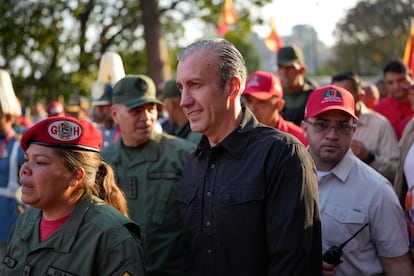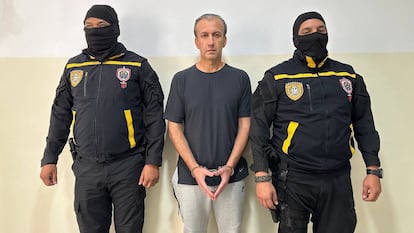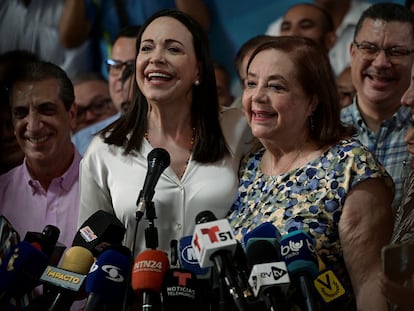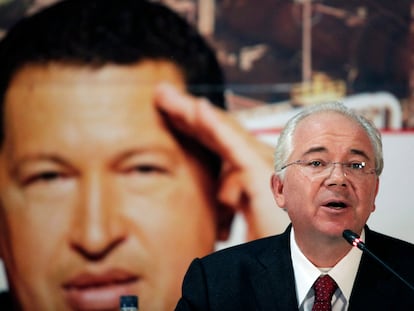Venezuela’s economic crisis fueled by looting of its state-owned oil company
PDVSA, the country’s main source of income, has been plundered by decades of corrupt and incompetent management

The decline of Petróleos de Venezuela SA (PDVSA), Venezuela’s state-owned oil company, has mirrored the country’s economic struggles over the past 10 years. The recent arrest of former oil minister Tareck El Aissami, a trusted ally of President Nicolás Maduro, for allegedly diverting billions of dollars, is the latest example of the decades-long drain on the country’s main source of income. Several PDVSA presidents have been accused of corruption since Hugo Chávez and his followers seized control of Venezuela. Two have been convicted, one fled into exile, and another died in prison.
Rafael Ramírez, a key figure in the Chávez power structure, is the exile. He served as president of PDVSA from 2004 to 2013 and was Hugo Chávez’s energy czar. Ramírez steadfastly denies the corruption charges made by former colleagues who allege he embezzled millions through irregular transactions, siphoning capital, secret accounts, bribes and money laundering. Opposition party legislators levied similar charges in 2016.
Ramírez was replaced by Eulogio del Pino in 2014. In September 2017, he was arrested at his home early one morning and charged with embezzlement, illegal confiscation, and overpricing in million-dollar transactions that harmed national interests. Anti-Chavistas had long suspected Ramírez of corruption, and the ruling party finally moved against him.
Nelson Martínez succeeded Del Pino and was arrested for corruption the next year at a time when massive protests rocked the country due to hyperinflation and widespread food shortages. Martínez died in prison later that year from a chronic heart condition aggravated by his arrest and imprisonment. His family said he had been detained without trial for a year.
Manuel Quevedo and Asdrúbal Chávez led PDVSA without any public scandals. However, they oversaw a company crippled by international sanctions, deteriorating infrastructure, and an exodus of skilled workers. PDVSA was severely undercapitalized due to the Maduro administration’s refusal to abandon a pegged exchange rate, causing Venezuela’s oil production to plummet from 2.5 million to 400,000 barrels per day. Then, oil minister El Aissami suddenly resigned in 2023 amid an anti-corruption crackdown. He was later implicated in a PDVSA scheme involving illegal cryptocurrency transactions that bled $21 billion from the company. After a brief pause in oil sanctions, the United States intends to reimpose restrictions on international sales if Maduro fails to promise free and fair elections on July 28.
The new PDVSA emerged 22 years ago on April 11, 2002 after widespread civil unrest briefly ousted Hugo Chávez from power. Chávez had sought to make PDVSA his main source of financing for politically motivated projects and replaced oil experts with political allies who had little or no experience in the industry. It was the first time PDVSA was embroiled in a public, political storm. Just before the attempted coup, a furious Chávez (wearing a helmet and blowing a whistle) commandeered the airwaves and publicly fired all the PDVSA executives.
Chávez and his supporters argued that PDVSA might be doing well, but the country was not. The government aimed to use the country’s golden goose to fund social investments, a move resisted by PDVSA management. Chávez devised a plan to take down PDVSA’s top executives, mocking them as a “meritocracy” and accusing them of inflating production costs, excessive compensation, favoring multinational companies, and being part of a privileged elite in a society with many unmet needs.

Founded by President Carlos Andrés Pérez in 1976, PDVSA emerged from the country’s oil nationalization process. It stood as a significant achievement for a democratic Venezuela, operating as an independent state-owned company for decades. It steered clear of politics and was mostly untainted by corruption. PDVSA’s professionalism and managerial acumen were a source of national pride, and its first president, Rafael Alfonzo Ravard, is held up as a role model in public administration.
The PDVSA management was so highly esteemed in 2002 that many believed Hugo Chávez wouldn’t challenge the company. It wielded significant influence over the national economy as a major international exporter of oil, gas and fuel. During the oil strike (December 2002-March 2003) orchestrated by opposition groups to oust Chávez, the wily leader outmaneuvered a PDVSA management team led by Juan Fernández. This win strengthened Chávez’s grip on state-owned businesses, later backed by the Armed Forces in 2004. Chávez fired thousands of workers and reshaped PDVSA into a populist energy company that would serve the revolution.
“To me, PDVSA’s decline is linked to the huge drop in oil and gas production, and the turning point was 2005,” said Rafael Quiróz, an oil economist and professor at the Central University of Venezuela. That’s when the production fell below three million barrels per day, never to recover.
Quiróz blames government mismanagement for destroying the country’s oil business. “By merging the roles of PDVSA president with the Ministry of Energy and Petroleum, the company was burdened with non-industry tasks like housing construction, food imports and goods distribution — all potential sources of corruption. It was now forced to serve a political agenda, revolutionary or not.” This inevitably led to a steady capital drain and corruption, says Quiróz.

Sign up for our weekly newsletter to get more English-language news coverage from EL PAÍS USA Edition









































